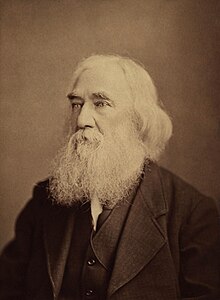Introduction
| Part of a series on |
| Libertarianism |
|---|
Libertarians advocate for the expansion of individual autonomy and political self-determination, emphasizing the principles of equality before the law and the protection of civil rights, including the rights to freedom of association, freedom of speech, freedom of thought and freedom of choice. They generally support individual liberty and oppose authority, state power, warfare, militarism and nationalism, but some libertarians diverge on the scope and nature of their opposition to existing economic and political systems. (Full article...)
Selected article
Social anarchism, sometimes referred to as socialist anarchism, is a non-state form of socialism and is considered to be the branch of anarchism that sees individual freedom as being dependent upon mutual aid.
Social anarchist thought emphasizes community and social equality as complementary to autonomy and personal freedom. They also advocate the conversion of present-day private property into social property or the commons while retaining respect for personal property. The term is used to describe those who—contra individualist anarchism—place an emphasis on the communitarian and cooperative aspects of anarchist theory while also opposing authoritarian forms of communitarianism associated with groupthink and collective conformity, instead favouring a reconciliation between individuality and sociality.
Emerged in the late 19th century as a distinction from individualist anarchism, social anarchism is considered an umbrella term that includes—but not limited to—the post-capitalist economic models of anarcho-communism, collectivist anarchism and sometimes mutualism as well as the trade union approach of anarcho-syndicalism, the social struggle strategies of platformism and specifism and the environmental philosophy of social ecology.
The term "libertarianism" was coined and used as synonymous for anarchism and socialism, hence the terms "social anarchism" and "socialist anarchism" are often used interchangeably with libertarian socialism, left-libertarianism or left anarchism.
Selected quote
| “ | I see America with half the number of prisons, half the number of prisoners, ten thousand fewer homicides a year, inner cities in which there's a chance for these poor people to live without being afraid for their lives, citizens who might be respectable who are now addicts not being subject to becoming criminals in order to get their drug, being able to get drugs for which they're sure of the quality. You know, the same thing happened under prohibition of alcohol as is happening now.
Under prohibition of alcohol, deaths from alcohol poisoning, from poisoning by things that were mixed in with the bootleg alcohol, went up sharply. Similarly, under drug prohibition, deaths from overdose, from adulterations, from adulterated substances have gone up. |
” |
| — Milton Friedman (1912–2006) America's Drug Forum (1991) |
Selected picture
 |
General images
Selected biography -

Lysander Spooner (January 19, 1808 — May 14, 1887) was an American abolitionist, entrepreneur, lawyer, essayist, natural rights legal theorist, pamphletist, political philosopher, and writer often associated with the Boston anarchist tradition.
Spooner was a strong advocate of the labor movement and is politically identified with individualist anarchism. His writings contributed to the development of both left-libertarian and right-libertarian political theory. Spooner's writings include the abolitionist book The Unconstitutionality of Slavery and No Treason: The Constitution of No Authority, which opposed treason charges against secessionists. (Full article...)
Related portals
Parent portals
Socio-political portals
Topics
Categories
Points of interest
| Points of interest related to Libertarianism on Wikipedia: History – Portal – Category – WikiProject – Alerts – Deletions – Assessment |
Associated Wikimedia
The following Wikimedia Foundation sister projects provide more on this subject:
-
Commons
Free media repository -
Wikibooks
Free textbooks and manuals -
Wikidata
Free knowledge base -
Wikinews
Free-content news -
Wikiquote
Collection of quotations -
Wikisource
Free-content library -
Wikiversity
Free learning tools -
Wiktionary
Dictionary and thesaurus


































